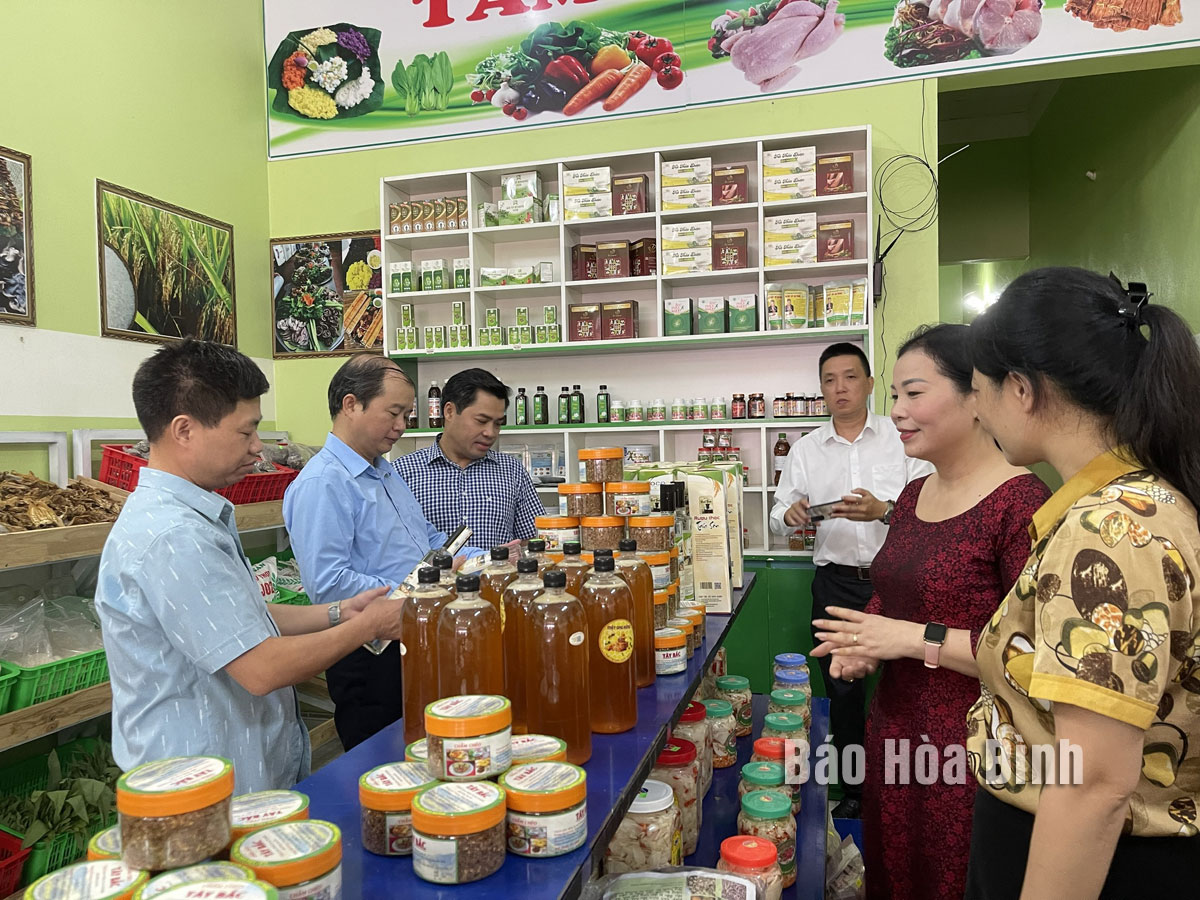
(HBO) – In an attempt to promote local agricultural products, over the past time, farmers’ unions at all levels in the northern mountainous province of Hoa Binh have carried out practical activities to assist their members to produce and develop local products under the "One commune - One product” (OCOP) programme, contributing to raising incomes for the locals.

Organic
farm produce and OCOP products produced by farmers in the province are
displayed for sale at a shop in Mu residential quarter, Da Bac town, Da Bac
district.
In recent years, farmers' unions at all levels in the province
have proactively organised supporting programmes to help their members develop
typical products and promoting OCOP products whilebuilding cooperative
groups and developing the collective economy.
According to statistics from the provincial Farmers' Union,
during 2018 - 2023, the union has supportedthe establishment of 72 new
cooperatives with 586 members, 329 cooperative groups with 4,973 members,
bringing the total number of cooperatives in Hoa Binh to 226 and 492
cooperative groups.
Besides, 1,136 science and technology training courses on
farming, animal husbandry, aquaculture for 66,000 members were opened during
the period.
In addition, the provincial union has signed cooperation
agreements with its counterparts in other provinces and cities, as well as the
post office and Viettel branch in Hoa Binh to promote local products in other
localities and e-commerce platforms. To date, there have been nearly 2,980 agricultural
and OCOP productshave been posted on e-commerce platforms including
Postmart.vn,Voso.vn, among others.
The
effectiveness of these activities has brought about positive changes in
socio-economic development in the province.Agriculture has shifted strongly
from traditional to commodity production. In particular, many farmers have
proactively applied science and technology to productionand engage in
production chains in association with building product brands, helping to
increase income and creating jobs for hundreds of labourers.
Dao Village’s honey – a product certified with a 3-star OCOP (One Commune One Product) rating by Thong Nhat Agricultural Cooperative in Dao Village (Hoa Binh City) – is highly regarded by consumers for its quality, richness, and variety in packaging. The distinctively sweet taste of Dao Village’s honey leaves a lasting impression on anyone who has tried it.
In alignment with Project No. 07-DA/TU, issued by the Hoa Binh provincial Party Committee on November 1, 2021, Lac Thuy district has actively promoted investment and supported the sustainable development of its industrial and handicraft sectors during the 2021–2025 period. Alongside this, the district has remained committed to preserving and revitalising traditional craft villages.
Located in the northern part of Lac Thuy district, with a temperate climate and fertile soil, Phu Thanh commune has great potential and advantages in growing tea. The long-standing experience, combined with strict adherence to organic farming practices in the tea gardens, ensures that the dried tea products from Phu Thanh and Lac Thuy as a whole are sold out immediately upon production, providing a stable and prosperous life for the local people.
Amid efforts to streamline the administrative apparatus, Hoa Binh province has intensified measures to address challenges in land clearance, resettlement support, and infrastructure investment, aiming to speed up the progress of key projects.
Hoa Binh province has posted an unprecedented economic growth rate of 12.76% in the first quarter of 2025, marking its highest quarterly performance to date and positioning it as the second fastest-growing locality in the country, trailing only Bac Giang province.
Under current regulations, products in the One Commune – One Product (OCOP) programme that are rated three stars or higher must undergo re-evaluation every three months. However, in reality, some of these products fail to consistently meet the required standards, raising concerns about the sustainability of their OCOP certification. This underscores the urgent need for producers to enhance product quality and gradually develop their OCOP products into strong, marketable brands.



